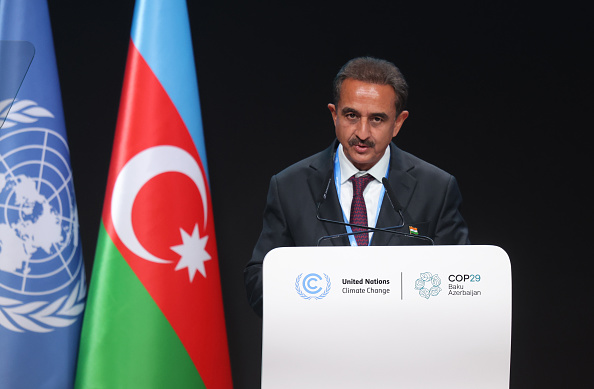India on Tuesday asked developed countries to show leadership in climate mitigation actions, as required under the 2015 Paris Agreement, by not just advancing their net-zero targets but by providing enough carbon space for developing countries like “ours” to develop.
Speaking on behalf of the Global South at the ongoing 29th session of the climate change conference of parties (COP29) in Azerbaijan’s capital Baku, India’s Minister of State for Environment, Kirti Vardhan Singh, said raising of climate ambitions to align with Paris temperature goals has to be preceded by free availability of green technologies, producing them on scale and availability of finance for their deployment, particularly in the Global South.
“On the contrary, some of the developed countries have resorted to unilateral measures making climate actions more difficult for the Global South.”
Delivering the national statement during a plenary session, he said about the emergent situation, “We are in, there is no option but to break all barriers to the flow of technology, finances and capacity to the Global South. The theme of this COP (Conference of Parties) — ‘enabling actions and enhanced ambition’ is very relevant in this context.”
Singh said that COP29 is the COP for climate finance — the New Collective Quantified Goals (NCQG) on climate finance for mobilising climate finance for meeting the needs and priorities of developing countries.
“We all need to appreciate that huge costs are being imposed on a developing country like ours for undertaking climate actions. What we decide here on NCQG must be founded on the principle of climate justice. The decisions must be ambitious and unambiguous, taking into consideration the evolving needs and priorities of the developing countries, and their commitment to sustainable development and eradication of poverty,” he said.
Singh added that India was categorically clear in saying that the next round of Nationally Determined Contributions (NDCs) is due for submission the next year.
“The breach of carbon space seems imminent towards the end of this critical decade,” Singh said.
He said India has achieved the 2015 NDC targets on emission intensity reduction and non-fossil-based installed electricity generation capacity much earlier than 2030 and has further enhanced its ambition.
India’s renewable energy capacity has nearly tripled from its 2014 levels and, “we are on the course to achieve the 500 GW target by 2030”.
He said that India has launched the Mission LiFE — Lifestyle for Environment — to encourage sustainable lifestyle practices at the global level.
“Mission LiFE inspires individuals, communities and societies to exercise choices and behaviours that focus on mindful utilisation of resources,” he said.
“We are at the forefront of pro-planet actions. The campaign – ‘Ek Ped Maa ke Naam’ was launched by our Prime Minister on World Environment Day in June this year. One billion saplings have been planted since then. ‘Plant4Mother’ which exhorts everyone to plant a tree as a mark of love, respect and honour of our mother and mother earth has resonated across the spectrum because of its powerful, inspirational and emotional connect.”
He said the International Solar Alliance, Coalition for Disaster Resilience Infrastructure (CDRI), Global Biofuel Alliance, Leadership Group on Industry Transition and Resource Efficiency and Circular Economy Industry Coalition have been launched by India with different partner countries, in pursuance of global climate actions.
India was categorically clear in saying that “the high carbon emission development pathways of the Global North in past have left very little carbon space for the Global South”.
“However, our growth trajectories for fulfilling the primary needs of sustainable development and poverty eradication cannot be compromised. Despite not contributing to the problem, we in the Global South are bearing a huge financial burden on account of climate actions for mitigation on the one hand, and losses and damages caused by climate change on the other, thus severely limiting our capacity to meet our developmental needs,” Singh added.
(IANS)














